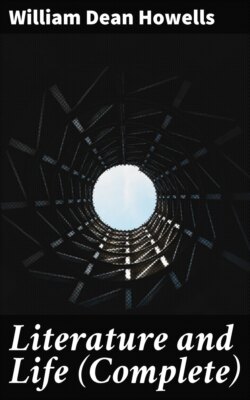Читать книгу Literature and Life (Complete) - William Dean Howells - Страница 28
VI.
ОглавлениеThere is no royal road to excellence in literature, but the young contributor need not be dismayed at that. Royal roads are the ways that kings travel, and kings are mostly dull fellows, and rarely have a good time. They do not go along singing; the spring that trickles into the mossy log is not for them, nor
“The wildwood flower that simply blows.”
But the traveller on the country road may stop for each of these; and it is not a bad condition of his progress that he must move so slowly that he can learn every detail of the landscape, both earth and sky, by heart.
The trouble with success is that it is apt to leave life behind, or apart. The successful writer especially is in danger of becoming isolated from the realities that nurtured in him the strength to win success. When he becomes famous, he becomes precious to criticism, to society, to all the things that do not exist from themselves, or have not the root of the matter in them.
Therefore, I think that a young writer’s upward course should be slow and beset with many obstacles, even hardships. Not that I believe in hardships as having inherent virtues; I think it is stupid to regard them in that way; but they oftener bring out the virtues inherent in the sufferer from them than what I may call the ‘softships’; and at least they stop him, and give him time to think.
This is the great matter, for if we prosper forward rapidly, we have no time for anything but prospering forward rapidly. We have no time for art, even the art by which we prosper.
I would have the young contributor above all things realize that success is not his concern. Good work, true work, beautiful work is his affair, and nothing else. If he does this, success will take care of itself.
He has no business to think of the thing that will take. It is the editor’s business to think of that, and it is the contributor’s business to think of the thing that he can do with pleasure, the high pleasure that comes from the sense of worth in the thing done. Let him do the best he can, and trust the editor to decide whether it will take.
It will take far oftener than anything he attempts perfunctorily; and even if the editor thinks it will not take, and feels obliged to return it for that reason, he will return it with a real regret, with the honor and affection which we cannot help feeling for any one who has done a piece of good work, and with the will and the hope to get something from him that will take the next time, or the next, or the next.
